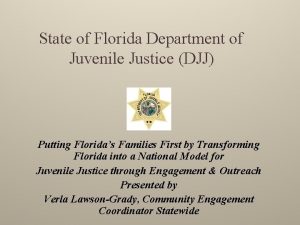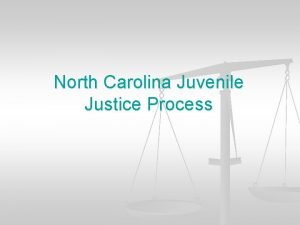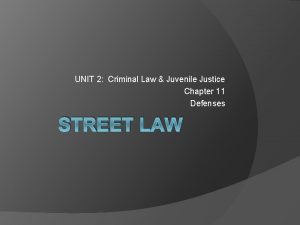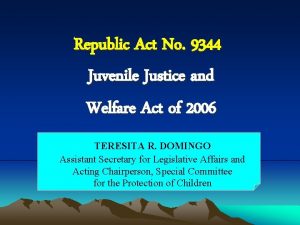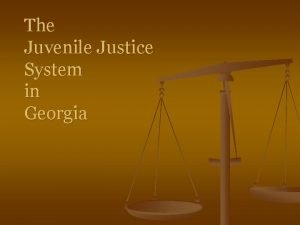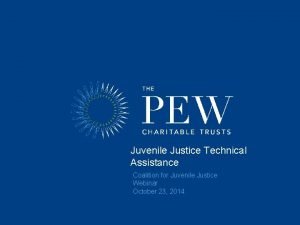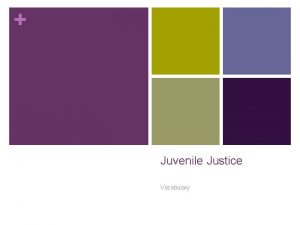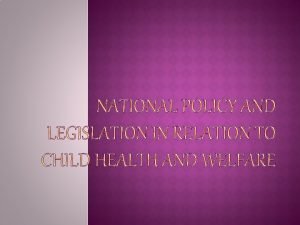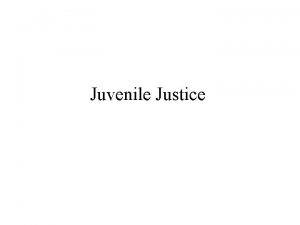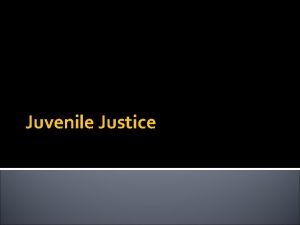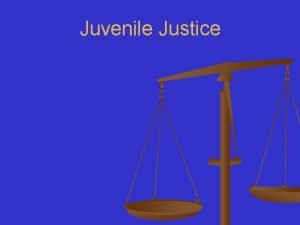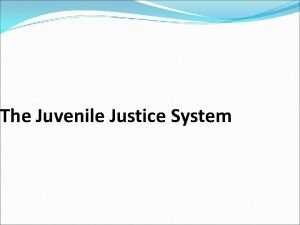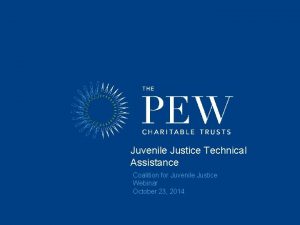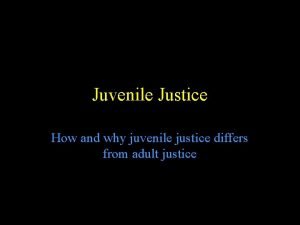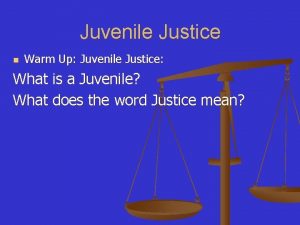REIMAGINING JUVENILE JUSTICE RJJ INITIATIVE Juvenile Justice Strategic











- Slides: 11

REIMAGINING JUVENILE JUSTICE (RJJ) INITIATIVE Juvenile Justice Strategic Executive Planning Workgroup June 6, 2019

• RJJ is a staff development/workforce investment initiative, sponsored by the Annie E. Casey Foundation and facilitated by School and Main Institute. • Based on positive youth development (PYD) curriculum developed in the state of Massachusetts and piloted in Pima County, Arizona. • Collaborative learning opportunity. • The goal is to transform juvenile justice systems and strengthen crosssystems collaboration. • Pinal County is one of 15 sites selected nationwide to be trained on how to deliver this curriculum.

A working definition of Positive Youth Development (PYD) is an intentional strategy or framework for helping young people meet their basic developmental needs (moral, social, cognitive, emotional & physical) by focusing on the whole child, not just a single problem that needs to be ‘fixed’. It builds off of young people’s strengths (assets) and is age/developmentally appropriate. PYD is grounded in the desire to help young people be/become resilient and views three key things as protective factors to help build resiliency: 1. Positive relationships 2. Clear, fair & high expectations and 3. Opportunities to connect, navigate and be productive

What is Positive Youth Development (PYD)? • Strength-based approach to working with youth. • Ensuring youth have the necessary resources, skills and competencies to achieve desired outcomes. • Moves away from punitive compliancebased “accountability”. • Youth make or influence decisions about their lives and set their own goals, then act on those decisions.

Changing The Narrative Traditional Juvenile Justice Positive Youth Development Role of youth in the community Target of change Agent of change Role of youth in the justice system Client Participant Mission of juvenile justice Public Safety Wellness Key strategy of juvenile justice Control youth behavior, gain compliance Connect youth with social and developmental resources Target of juvenile services Youth problems and deficits Youth strengths and assets Purpose of service delivery Supervision and control Attachment and engagement Intervention methods • • • Probation supervision to ensure youth compliance with court orders Individual and family counseling, group therapy (insightbased) Job counseling, community service as punishment Outdoor challenge programs Mentoring, Big Brother/Big Sister Remedial education • • • Case management to ensure youth access to range of social resources Peer counseling, leadership development, family living skills Work experience, community service as job preparation, career exploration Conservation projects, community development projects, recycling and community beautification projects Youth/adult mentors work together on community service projects, intergenerational projects with elderly, etc. Cross-age tutoring (youth teach younger peers), educational action teams, decision-making skills training

The RJJ Curriculum • Six classes (9: 30 am - 3: 30 pm) held at the Florence Community Library, beginning July 30, 2019 and concluding December 17, 2019. • A cohort of attendees will begin and end together; the curriculum builds on previous classes. Modules: 1. Fundamentals of Positive Youth Development 2. Using a Cross-Systems Approach 3. Addressing Racial and Ethnic Disparities in the Juvenile Justice System 4. Authentic Youth Voice and Youth Leadership 5. Fostering Positive Family Relationships in the Juvenile Justice System 6. Transforming Policies and Practice – Final Presentations, Reflections and Recommendations

Transforming Our Shared Systems • RJJ concludes with a presentation to the Juvenile Justice Strategic Executive Planning Workgroup. • The team will present ideas, goals and potential changes to Pinal County Juvenile Court Services policies and practices to help break down barriers and build more trusting and collaborative relationships between and across agencies. • This will enhance success of youth across our systems.

Shared Goals • Introduce the principles of positive youth development and strengths-based case management. • Create a system where we engage youth and families with a collaborative approach. • Continue to change the narrative around juvenile justice.

Why is this needed? • Coordination Cooperation Collaboration • Bridging gaps • Sharing resources from a joint decision-making perspective • Thinking differently about how we do what we do, and what our defined roles are • Youth voice and family engagement • Tackle the elephants in the room – implicit bias, Racial & Ethnic Disparities, and the natural tension between public safety and youth wellness

How do we get there from here? • County cohort of Juvenile Court Services staff and collaborative partner organizations who participate in the Juvenile Justice Strategic Stakeholders Workgroup. • We will reach out to partners in June 2019. • Diverse participation – across gender, racial, ethnic spectrum, as well as line officer/staff perspective and supervisors/middle managers. • The cohort will train together and work together toward the primary goal: examining current practices and strengthening collaboration.

Questions? Celena Angstead Division Manager | Youth Justice Center Pinal County Juvenile Court Services 1410 E. Diversion Dam Rd. Florence, AZ 85132 T: (520)866 -4010 | Email: CAngstea@courts. az. gov Michelle Lunn Division Manager | Juvenile Probation Pinal County Juvenile Court Services 971 N. Jason Lopez Circle, Building D - Ste. 500 Florence, AZ 85132 T: (520)866 -7075 | Email: MLunn@courts. az. gov
 Reexamining the examen
Reexamining the examen Minnesota juvenile justice system
Minnesota juvenile justice system State of florida department of juvenile justice
State of florida department of juvenile justice North carolina juvenile justice process
North carolina juvenile justice process Chapter 11 basic concepts street law
Chapter 11 basic concepts street law Expulsion
Expulsion Juvenile justice system in georgia
Juvenile justice system in georgia The juvenile justice and welfare act of 2006
The juvenile justice and welfare act of 2006 Georgia juvenile justice system
Georgia juvenile justice system Coalition for juvenile justice
Coalition for juvenile justice Juvenile justice vocabulary
Juvenile justice vocabulary Juvenile justice act 2000
Juvenile justice act 2000


